The Coming of Conan Re-Read: “Queen of the Black Coast”
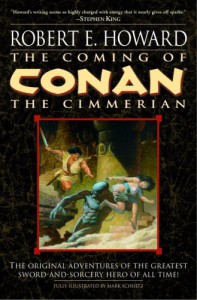 Bill Ward and I are reading our way through the Del Rey Robert E. Howard collection The Coming of Conan. This week we’re discussing “The Queen of the Black Coast.” We hope you’ll join in!
Bill Ward and I are reading our way through the Del Rey Robert E. Howard collection The Coming of Conan. This week we’re discussing “The Queen of the Black Coast.” We hope you’ll join in!
 Bill Ward and I are reading our way through the Del Rey Robert E. Howard collection The Coming of Conan. This week we’re discussing “The Queen of the Black Coast.” We hope you’ll join in!
Bill Ward and I are reading our way through the Del Rey Robert E. Howard collection The Coming of Conan. This week we’re discussing “The Queen of the Black Coast.” We hope you’ll join in!
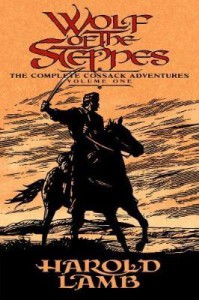 I’m deep in the writing mines all this week, but I emerged into the sunlight to let you in on a cool article I stumbled across featuring the talented Harold Lamb. Seems he’s recently been noticed in a Ukranian magazine article penned by Olek Veremko-Berezhny.
I’m deep in the writing mines all this week, but I emerged into the sunlight to let you in on a cool article I stumbled across featuring the talented Harold Lamb. Seems he’s recently been noticed in a Ukranian magazine article penned by Olek Veremko-Berezhny.
I especially like the image of Lamb drawn for the article.
 Bill Ward and I are reading our way through the Del Rey Robert E. Howard collection The Coming of Conan. This week we’re discussing “The Scarlet Citadel.” We hope you’ll join in!
Bill Ward and I are reading our way through the Del Rey Robert E. Howard collection The Coming of Conan. This week we’re discussing “The Scarlet Citadel.” We hope you’ll join in!
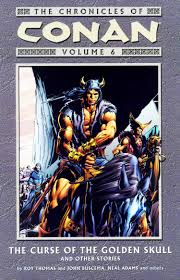 I’ve come down with an odd recurring fever. I’ll be perfectly miserable for hours, then it will break, and I’ll think I’m on the mend… only to have the damned thing come back. It’s really messing with my ability to get writing and house work finished. Also it’s uncomfortable.
I’ve come down with an odd recurring fever. I’ll be perfectly miserable for hours, then it will break, and I’ll think I’m on the mend… only to have the damned thing come back. It’s really messing with my ability to get writing and house work finished. Also it’s uncomfortable.
The one bright spot is that I’ve finally been able to read the old Marvel Conan comics, written/adapted by Roy Thomas. The local library has a pretty complete collection. I never read these when I was a kid (no idea why) so I’m coming upon them very fresh, and it turns out that they’re really fun sword-and-sorcery comics.
I started reading with volume 6, which is when Roy Thomas himself writes that he felt like he really had a handle on what he was doing.
 Bill Ward and I are working our way through the Del Rey Robert E. Howard collection The Coming of Conan. This week we’re discussing story four, “The Tower of the Elephant.” We hope you’ll join in!
Bill Ward and I are working our way through the Del Rey Robert E. Howard collection The Coming of Conan. This week we’re discussing story four, “The Tower of the Elephant.” We hope you’ll join in!
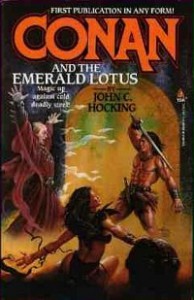 With me in the midst of about four different projects in four different stages, I’m keeping things short today and pointing visitors to some previous REH essays they might not have seen.
With me in the midst of about four different projects in four different stages, I’m keeping things short today and pointing visitors to some previous REH essays they might not have seen.
First, why Conan and the Emerald Lotus is my favorite Conan pastiche, with the possible exception of Conan and the Living Plague.
Second, an overview of the better Conan pastiches, filtered through my own sensibilities.
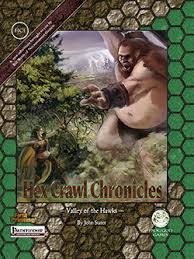 From time to time I talk about world building on this site. I think any writer has to give an awful lot of thought to world building, i.e. presenting a setting that’s not just consistent and logical but interesting.
From time to time I talk about world building on this site. I think any writer has to give an awful lot of thought to world building, i.e. presenting a setting that’s not just consistent and logical but interesting.
One of the reasons role-playing game setting books appeal to me so much is that a good one just drips with ideas, and can be chock full of world building inspiration both for writers and gamers. I’ve discussed other great settings, but I’m overdue discussing the Hex Crawl Chronicles written by John Stater.
 Bill Ward and I are working our way through the Del Rey Robert E. Howard collection The Coming of Conan. This week we’re discussing story three, “The God in the Bowl.” We hope you’ll join in!
Bill Ward and I are working our way through the Del Rey Robert E. Howard collection The Coming of Conan. This week we’re discussing story three, “The God in the Bowl.” We hope you’ll join in!
Howard: While I understand it’s a different kind of story for Conan, and that it’s interesting to look at through the lens of understanding how Howard’s writing developed, I’m evaluating each of these tales with a fairly simple agenda foremost: Do I enjoy them as stories, and do they achieve what they’re designed to do?
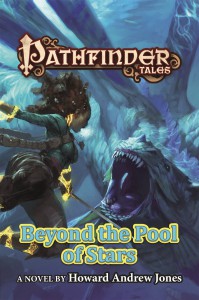 I learned some more cool news yesterday — my first two Pathfinder novels, Plague of Shadows and Stalking the Beast, are now available on Kindle. I’m assuming that my new one will be as well, when it’s released in October.
I learned some more cool news yesterday — my first two Pathfinder novels, Plague of Shadows and Stalking the Beast, are now available on Kindle. I’m assuming that my new one will be as well, when it’s released in October.
Speaking of which, there are still twenty days left to enter the Goodreads contest for a chance to win a free copy of Beyond the Pool of Stars! Swashbuckling action! Hair-raising escapes! Lost jungle ruins! Lizardmen! A kickass female protagonist! What are you waiting for, eh?
Bill Ward and I are working our way through the Del Rey Conan collection The Coming of Conan. This week we’re discussing “The Frost-Giant’s Daughter.” We hope you’ll join in!
Howard: Those first two paragraphs are so well written I had to stop and re-read them. Here, again, is proof of Robert E. Howard’s incredible descriptive powers. Some of that talent seems to have been innate with him, but I can’t help thinking he’s even better than he could have been because he spent so much time working with poetry, where every word counts even more than in prose. Well, actually, every word in prose should count, but too often prose writers don’t write that way. Howard at his finest always remembers this.